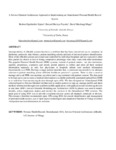| dc.description.abstract | Interoperability of eHealth systems has been a problem that has been unresolved due to variations in platforms, protocols, data formats, patient matching criteria and lack of universal patient identification. Most of the eHealth systems are owned and controlled by individual hospitals and not exposed to other third parties by choice or fear of losing competitive advantage when they share with other institutions The popular Personal Health Record (PHR) systems, instead of patient centric, are also institution specific, proprietary, expensive and mostly permit patients to collect and enter all their medical information manually as only few physicians or hospitals submit their medical information electronically to a PHR. Having a unique patient identifier that is consistent nationwide is the ultimate solution to patient matching across different healthcare provider’s systems. There is also a need to manage and avail PHR data anytime, anywhere and to any terminal with patient consent. The data need to be kept up to date as soon as medical information is available preferably automated upload from EMR or in real-time from monitoring devices through open APIs. We thus designed an Omnichannel PHR solution based on Service Oriented Architecture to enable patients to sign up, manage profile and share medical information through cross platform mobile application, web application and monitoring devices in real time. IBM’s Service Oriented Modelling and Architecture (SOMA) phases was used to model, identify, select, implement, deploy and monitor the services in the Omnichannel PHR solution. The main goal of using SOA was to provide consistent services across all channels, terminals or devices. This research therefore recommends open APIs using SOA for central identification and management of personal health records, use of open source technologies and adoption of Internet of Things to collect vital patient medical information in real-time | en_US |

